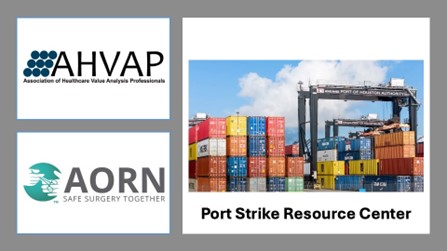AHVAP and AORN Collaborate to Launch Joint Port Strike Resource Center

Dear AHVAP Members and Partners:
AORN is a strategic partner of the Association of Healthcare Value Analysis Professionals (AHVAP). As part of this relationship, we are sharing this joint communication with all AHVAP and AORN members regarding the imminent port worker strike that is likely to begin at midnight tonight.
As many of you are aware, the potential strike by port workers across major shipping ports in the United States is raising serious concerns regarding the availability of essential medical products and medications. Should this strike occur, we expect significant potential disruptions in the medical supply chain, particularly for imported goods and raw materials critical to patient care.
The healthcare sector, which relies heavily on timely deliveries of surgical instruments, medical devices, personal protective equipment (PPE), and pharmaceuticals, could face severe shortages in the coming weeks. These disruptions will likely have direct consequences for our broader healthcare and specifically perioperative teams, increasing the risk of delayed surgeries, treatment interruptions, and shortages of critical medical supplies.
Anticipated Impacts
- Delays in Medical Product Deliveries: Many medical products and supplies are imported through major shipping ports, and the strike could severely delay the arrival of essential items such as surgical trays, sutures, and sterilization supplies. This could affect operating room schedules and patient safety.
- Shortages of Medications: Medications, especially those with limited domestic production or reliant on international sources, may face supply shortages. This could impact everything from anesthetics used in perioperative care to commonly prescribed medications.
- Increased Costs and Resource Allocation: Limited availability of supplies could drive up costs for the medical products that remain in circulation, forcing healthcare organizations to allocate additional resources to source alternatives or manage existing stock. Value analysis professionals will be called upon to evaluate alternative suppliers and products, balancing cost, quality, and availability.
What We Can Do
In preparation for potential shortages, it is essential that we take proactive measures to mitigate the impact on patient care and organizational operations. We recommend the following immediate actions:
- Inventory Review: Conduct a thorough review of your current inventory for critical perioperative supplies and medications. Identify potential shortages and prioritize procurement of essential items while maintaining flexibility for alternative products.
- Collaboration with Industry Partners: Work closely with your Industry Partners to stay informed about their inventory and shipment statuses. Open communication can help identify delays early and provide opportunities to seek alternative sourcing options before supplies run out.
- Evaluating Alternatives: Engage your value analysis teams to evaluate and pre-approve substitute products or alternative vendors for high-risk items. Having these alternatives vetted ahead of time can prevent treatment disruptions and delays in perioperative care.
- Resource Sharing and Partnerships: Collaborate with other healthcare organizations in your region to explore resource-sharing agreements that ensure critical supplies remain available to all facilities in times of shortage.
Looking Ahead
We recognize that the uncertainty surrounding the potential port worker strike can create anxiety for healthcare providers and administrators alike. However, by taking early, coordinated steps to prepare, we can mitigate the effects of supply chain disruptions and continue providing high-quality, timely care to our patients.
We encourage each of you to engage your teams in discussions around contingency planning and to communicate regularly with your supply chain and procurement departments as we monitor the situation closely.
Thank you for your continued dedication and adaptability in these challenging times. Together, we can safeguard the delivery of essential care in the face of uncertainty. If you have any questions or would like further guidance on mitigating the impacts of this potential strike, please do not hesitate to reach out to either AORN or AHVAP. AHVAP has created an emergency resource page for this issue, which is available to all healthcare professionals here: ACCESS HERE.
As new information becomes available, AHVAP will post it on this dedicated resource center for all AHVAP and AORN members, as well as the general healthcare community. We encourage perioperative and healthcare value analysis teams to collaborate on this potential threat to healthcare supply chain to ensure continuity of care for your patients.
Regards,
J. Hudson Garrett Jr., Ph.D., MSN, MPH, MBA, AE-MBA, FNP-BC, IP-BC, PLNC, VA-BC, BC-MSLcert™, HACP, HACP-IC, MSL-BC, CPHRM, CHIPP-B, CIC, LTC-CIP, CPPS, CPHQ, CVAHP™, ICE-CCP, CMRP, CPXP, CAE, eFACHDM, FAOM, FAAPM, FRSPH, FNAP, FACHE, FSHEA, FIDSA, FAHVAP
Executive Director and Executive Vice President
Association of Healthcare Value Analysis Professionals, Inc. (AHVAP)
Lisa Spruce DNP, RN, CNS-CP, CNOR, ACNS, ACNP, FAAN
Sr. Director of Evidence-Based Perioperative Practice
Association of Perioperative Registered Nurses (AORN)

